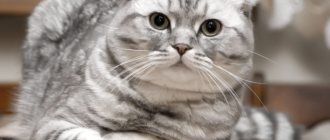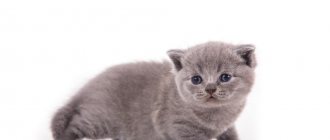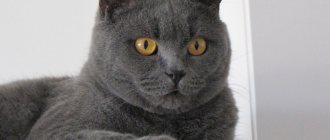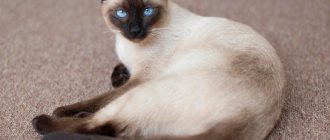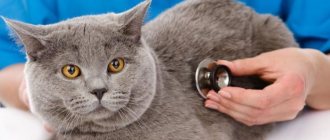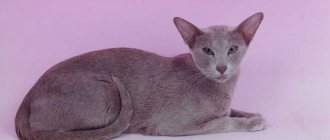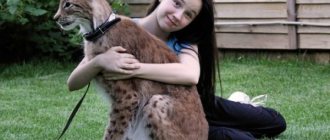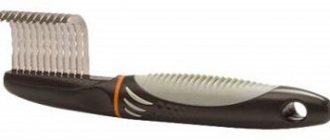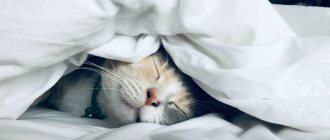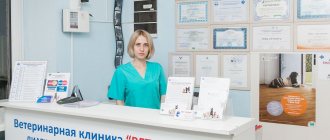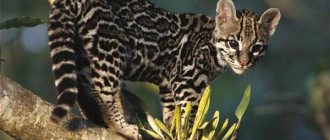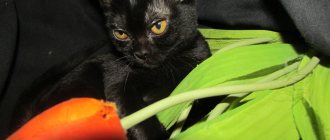In addition to the breed, the cost of a British kitten is also influenced by its origin and color.
Of course, how much a Briton will cost will be determined by the popularity of the breed, because the more famous it is, the cheaper the plush ball will cost. The most popular breed is the British Shorthair cat. Many cat lovers want to buy just such a pet. Such popularity is no secret, because, apart from its beautiful blue color, this cat does not need constant attention, and can easily remain alone for a long time. She has a calm, gentle character and excellent immunity.
What affects the cost of a British kitten
- The main reason influencing the price of a British kitten is its class. Show class cats are recognized as the most expensive and elite. For one small lump they ask for 15-30 thousand rubles, focusing on age, gender, pedigree, color.
- British breeding class kittens are sold a little cheaper. The price for these pets ranges from 9-15 thousand rubles.
- The most budget option will be the British pet class. A good kitten of this class costs between 3-6 thousand rubles. This cat will make a wonderful pet, but he will definitely need to be spayed/neutered.
- At a reasonable price, it is possible to purchase a purr without documents. Among their representatives there are British, which basically correspond to the breed standards, and those that only partially resemble them.
Not everyone knows how much you can buy a fold-eared kitten from a breeder. Many people want to save money, and in the hope that they will be lucky with a pet, they take a kitten from their hands on a website on the Internet, a bird market, or through an advertisement in a newspaper. However, some later regret it, because the kitten is growing, and it is not a fact that it will correspond to its breed. Flaws in the structure of the body, color, etc. are not excluded. But it is not yet known what kind of character the pet will have?!
What vaccinations are needed?
You need to understand that the vaccine will not protect you 100% from infection, but will only significantly reduce the likelihood of your pet developing the disease. Also, in a vaccinated animal, the disease progresses more easily, without complications.
Kittens are vaccinated against several common viral and bacterial infections:
- Panleukopenia (also known as distemper in common parlance) is a highly contagious deadly disease. Kittens tolerate vaccinations against it well. In most developed countries, animals are required to be vaccinated against distemper, since a pet can become infected, even without leaving the confines of a private yard, from rodents and birds.
- Calcivirosis is a viral respiratory pathology, accompanied by conjunctivitis and the appearance of ulcers on the oral mucosa. The infection is easily transmitted through animal contact. 30% of infected individuals die. The vaccine does not cause severe side effects.
- Rhinotracheitis (also called feline herpes) is a severe viral disease accompanied by damage to all body systems. The likelihood of death is high. Therefore, vaccination against rhinotracheitis is considered one of the main and mandatory.
- Rabies. Cats that leave the house and yard and regularly come into contact with other animals are required to be vaccinated against this terrible incurable disease. But if the kitten does not go outside the house, then you should think carefully before getting vaccinated, since it can cause serious complications, including malignant tumors.
- Leukemia is a viral pathology that suppresses the animal’s immune system. The disease is difficult to treat and the likelihood of death is high. The virus is transmitted by contact: through saliva, food, drinks.
- Chlamydia is a bacterial disease accompanied by conjunctivitis and symptoms of pneumonia. The pathogenic bacterium can spread sexually, airborne, through food, and can also be transmitted from a pregnant cat to kittens in the womb. It is recommended to vaccinate only those Scottish kittens that live near infected animals, since the drug can cause many complications.
- Infectious peritonitis is a fatal viral pathology. When the virus enters the digestive tract, not all Scottish kittens become ill, but those who become ill almost always die.
How much does a British Fold kitten cost with and without documents?
A simple fluffy ball that does not have documents that will confirm its origin costs from 100 to 200 dollars, or from 5.7 to 11.5 thousand rubles. Please note that even if the seller assures you of the breed of the animal, no one will give a guarantee to confirm his words.
For example, how much you can buy a purebred British chinchilla kitten for is easy to understand from advertisements on the Internet. On average, the price tag costs 400-500 dollars, or 23-30 thousand rubles.
By the way, these kittens are mostly sold without the right to breed. As they age, these pets will have to be spayed or neutered so that they are not used as breeders. Nevertheless, they are perfect for the role of a pet.
If you want to participate in exhibitions and breeding of the breed in the future, you should be prepared to pay about $1,000, or about 55 thousand rubles, for the baby. In this case, you must provide all the necessary documents certifying the breed of the kitten. A good breeder will certainly help with advice and answer all the buyer’s questions.
Prices for kittens are approximate for the market, based on demand in a certain region, they may differ up or down. There is often a long queue for British pets from champion parents.
Vaccination calendar
The table shows the vaccination and revaccination schedule for Scottish Fold kittens.
| illnesses | first vaccination (number of weeks from birth) | second vaccination (after how many weeks) | subsequent revaccinations |
| panleukopenia | 8–12 | 3 | annually |
| calcivirus | 8–12 | 3 | annually |
| rhinotracheitis | 8–12 | 3 | annually |
| rabies | 12–14 | need not | not required |
| leukemia | 8 | 12 | annually |
| chlamydia | 8–12 | 3 | annually |
| peritonitis | 16 | 20 (and another one a year later) | not required |
About the British classes
A show class kitten is the most prestigious and, accordingly, expensive among other pets of the British breed. Often he grows up to be a participant in various shows and exhibitions. Kittens that have lilac and chocolate colors are considered the rarest, which is why they are much more expensive.
Breeders who breed British cats mostly trust such cats only to experienced and ambitious people. In turn, this class includes fluffies that bear excellent show characteristics. A show-class British breed cat sells for at least 15 thousand rubles.
A British kitten of the breed class will cost slightly less, since it differs from the previous ones in minor breed flaws. Most of them are quite capable of taking part in shows and also giving birth to offspring similar to the show class. But a breed class cat has significant deviations from the established standards. For example, an incorrect bite or shape of the ears, color or structural features of the tail.
A British representative of the Pet class is not allowed to participate in exhibitions due to defects associated with the shade of the coat, eyes or other non-compliance with breed standards. Of course, such flaws are reflected in the cost, but these kittens can become wonderful pets.
Preparing for vaccination
About 2 weeks before vaccination, Scottish kittens must be dewormed. The interval between removal of helminths and vaccination should be at least 10 days. Also, if necessary, treat against fleas and ear mites.
A week before vaccination, it is necessary to create such conditions for the Scottish kitten so that he is not exposed to stress and does not overexert himself physically and mentally. You cannot transport your pet anywhere, bathe it, or give it new food. If the kitten is dirty, then you don’t need to bathe it all, just wash the dirty area of the body.
Vaccination is carried out either in a veterinary clinic or at home, if such a service is provided by the selected institution. Veterinarians advise doing the first vaccination at home. When there are no maternal antibodies left in the kitten’s body, its immunity is extremely low before the vaccine is administered. In this condition, the pet can catch an infection during the journey to the clinic.
YOU SHOULD KNOW! The vaccine is chosen by the veterinarian, but takes into account the wishes of the owner of the Scottish pet.
On the appointed day of the procedure, the doctor:
- checks the kitten's body temperature;
- examines the nasal and oral cavities, ears;
- checks to see if the kitten has started teething;
- assesses the general well-being of the animal, the degree of its activity and vigor.
Based on the results of the examination, the veterinarian decides whether to carry out or postpone vaccination. Only healthy kittens are vaccinated.
A sick pet cannot be injected with the vaccine: firstly, a weakened body will not be able to develop high resistance to immunity to infection, and secondly, the animal will have a hard time withstanding the procedure. For the same reasons, old Scottish cats are not vaccinated.
What a pet needs: maintenance features
Having purchased an ordinary or fold-eared Briton, you should think: what does a pet need for a calm and comfortable life in the house? If you decide to buy a cat, it is important to ensure a decent existence for your pet:
- Prepare two bowls. One should be used for water and the other for food. By the way, it is best if the bowls for dry food and canned food were different.
- If the animal is from a specialized nursery, it is mainly trained to go to the tray. The breeder must tell you what kind of litter the kitten is used to using. At first, you need to show your baby where the tray is located. It is very important to keep the Briton clean, remembering to periodically replace the filler.
- To care for the fur of a handsome lop-eared cat, you should get a rubber oval brush with small, soft teeth.
- Take care of your scratching post. Mostly it looks like a column with a platform and a small house. This design can be compared to a playground that entertains and develops your pet, and at the same time helps sharpen its sharp claws.
- A place to sleep. Domestic cats need a safe and cozy place, especially since British kittens love to sleep. It’s time to buy a special house or sun lounger.
First vaccination
There is no point in vaccinating Scottish Fold kittens before 8–12 weeks. In recently born babies, maternal antibodies are still active in the body, and the vaccine will be unnecessary.
The first vaccination for a Scottish kitten is given:
- at 2 months of age, if he was fed artificial food;
- at 3 months, if the cub was fed with mother's milk.
NOTE! After the first vaccination, 2-3 weeks later, revaccination is done, that is, repeated vaccination, in order to consolidate the positive changes in immunity.
Is it mandatory to vaccinate a Scot?
Many people believe that if a kitten does not go beyond the boundaries of the apartment, then vaccinations are completely unnecessary. One can argue with this opinion.
Regarding the broad-spectrum vaccine, it should be said that it prevents a fairly large number of infections and viruses. However, some cat owners are convinced that their pets are completely protected within the confines of an apartment or house. But it is worth noting that the owners themselves leave the apartment, go outside, and go to visit places where there are other pets or free-roaming animals.
This all leads to the fact that people themselves are able to bring the infection or virus directly into their home, for example on shoes, hands or clothes . In such conditions, a kitten or adult cat can easily become infected.
What about the rabies vaccine? Carriers of this virus are found both among wild animals and among domestic animals (street or homeless). Rabies is transmitted by a bite.
Where can your Scotsie get the rabies virus? For example: at animal shows; when moving or traveling; in case of mating; when visiting a veterinary center; if you have other, unvaccinated, free-roaming pets in your home. In addition, mice and rats with the rabies virus are rarely, but still found (this information is especially relevant for people who live in private homes).
© shutterstock
Of course, everyone decides for themselves whether their four-legged friend needs to be vaccinated or not, but by vaccinating a Scottish kitten, you thereby protect his life and health.
Care and monitoring of animals after vaccination
In the first days after the procedure, you need to pay special attention to the kitten’s health.
Tips for those who prefer to administer the vaccine to their pet themselves:
- Remove shoes and outerwear away from the cat.
- Clean the house thoroughly. Wash floors and rugs frequently.
- Ensure the cleanliness of animal products.
- Wash food and water bowls thoroughly.
- Limit the kitten's contact with other animals.
- Leave light foods and fruits in the Scots diet.
- Do not expose the animal to sudden changes in temperature.
- Do not bathe the kitten for several days.
Important! If vaccination is carried out in a veterinary hospital, the doctor should give recommendations on the care of the Scot for the first time after vaccination.
Why is vaccination necessary?
Veterinarians insist on mandatory vaccination of all pets, regardless of whether there are other animals at home or whether the Scot will be walking outside. This need is caused by the high risk of illness from a virus that can accidentally enter the house.
Such infections include panleukopenia, calicivirus and others.
Important! Vaccinations and regular revaccination will protect Scottish kittens from most diseases.
What age vaccinations are required for Scottish kittens?
No matter what breed of kitten you have, Scottish Fold (low-eared) or Scottish Straight (straight-eared), British or the most common, it needs care and attention.
For good health and long life of your pet, it is necessary to receive comprehensive vaccinations in a timely manner. If the owner refuses to vaccinate, serious health problems for the animal may arise.
© shutterstock
There are two main types of vaccines that are given to kittens according to age and annually throughout their lives:
- Against infections and viruses (comprehensively). Protects against diseases such as:
- Rhinotracheitis (required);
- Panleukopenia (required);
- Calicivirus (required);
- Chlamydia (recommended).
- Against an infectious disease caused by the Rabies virus:
- Rabies (required).
In addition to the main vaccines listed, others can be given additionally to a Scot at the owner’s discretion. For example: from ringworm (especially important for those Scots who live in the same apartment with a dog), coronavirus, viral leukemia, infectious peritonitis.
